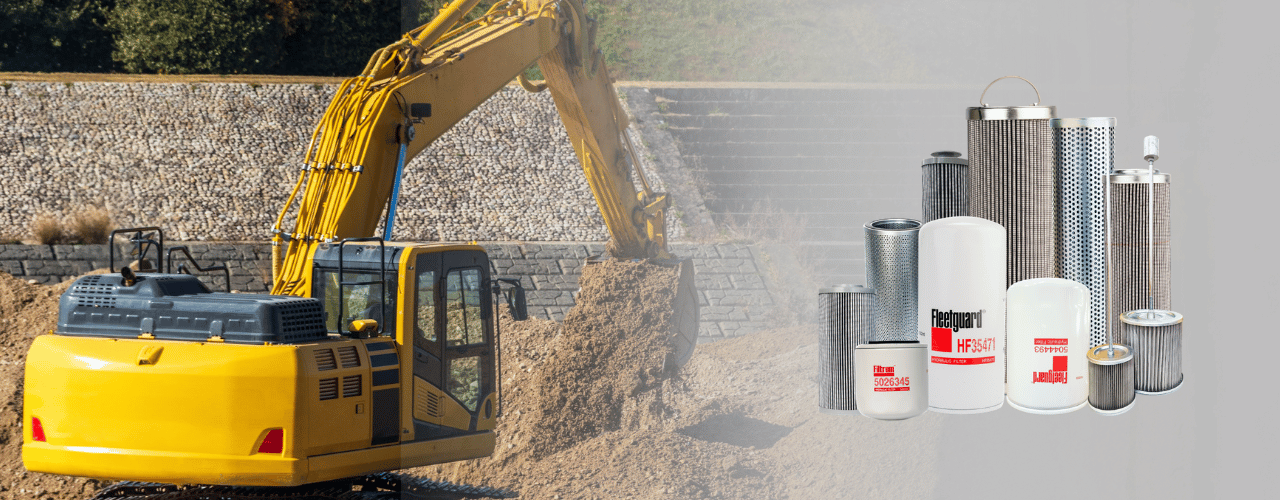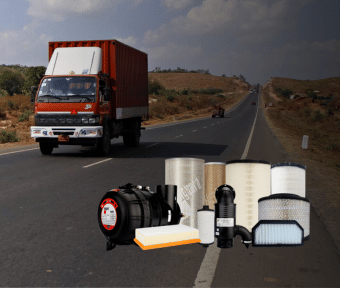Product | 21 Oct 2025
Engines operating in harsh environments are continually exposed to conditions that accelerate wear, corrosion, and contamination.
Engines operating in such conditions face an uphill battle. Without proper protection, even the most robust engines succumb to premature wear and catastrophic failure.
The challenge isn't just about keeping engines running; it's about maintaining peak performance when conditions are at their worst. This is exactly why high quality air filters are absolutely necessary.
Why Air Filtration Matters: The Silent Engine Killer
Every cubic foot of air contains thousands of particles invisible to the naked eye. These microscopic invaders include silica dust, pollen, carbon particles, and metallic debris.
Here's what happens inside your engine: contaminated air enters the combustion chamber. Abrasive particles scrape against cylinder walls. They are embedded in piston rings. They contaminate engine oil, turning lubricant into grinding paste. The result? Accelerated wear that can reduce engine life by 50% or more.
Auto Air Filters serve as the first line of defense. But standard filtration often falls short in extreme conditions. A basic paper filter might capture larger particles, yet microscopic contaminants slip through. These tiny invaders cause the most insidious damage because they reach critical engine components where wear occurs at the molecular level.
The economic impact is staggering. Premature engine failure costs thousands in repairs and downtime. Reduced fuel efficiency increases operating expenses. Component replacement becomes frequent and expensive. What starts as a filtration problem quickly becomes a business crisis.
What Makes a Filter Advanced: Engineering Excellence
Modern Industrial Air Filters have evolved far beyond simple paper media.
Multi-layer filter media represents a quantum leap in filtration science. Unlike single-layer filters, these systems use graduated density layers. Coarse pre-filtration captures large particles. Medium-density layers trap smaller contaminants. Ultra-fine final layers stop microscopic particles that would otherwise reach engine components. This staged approach maximizes efficiency while maintaining airflow.
Nanofiber technology has revolutionized filter construction. These incredibly thin fibers create a web-like structure with pore sizes measured in nanometers. The result? Automotive Air Filters that capture 99.97% of particles as small as 0.3 microns. That's smaller than most bacteria and viruses.
High dust-holding capacity extends service intervals dramatically. Advanced Air Compressor Air Filter designs incorporate pleated media with increased surface area. Some filters hold ten times more contaminants than conventional alternatives. This means fewer filter changes and lower maintenance costs.
Durable construction addresses the mechanical stresses of harsh environments. Reinforced frames resist warping under extreme temperatures. Moisture-resistant seals prevent bypass. Corrosion-resistant materials withstand chemical exposure. These engineering improvements ensure consistent performance throughout the filter's service life.
Air Filtration systems now feature intelligent monitoring capabilities. Sensors track pressure differential across filter media. When contamination reaches predetermined levels, alerts notify operators of required maintenance. This predictive approach prevents unexpected failures while optimizing filter utilization.
Benefits of Advanced Air Filtration: Real-World Performance
Mining operations report 40% longer engine life when using premium Compressed Air Filtration systems. Construction fleets document 25% reductions in maintenance costs. Agricultural equipment shows improved fuel efficiency and extended service intervals.
The protection extends beyond engines themselves. Clean air improves turbocharger performance. It reduces exhaust system contamination. It minimizes after-treatment system maintenance. The cascading benefits touch every aspect of engine operation.
Standard filtration might require daily filter changes during peak construction seasons. Advanced Industrial Air Filters extend change intervals to weekly or even monthly, depending on conditions. The labor savings alone justify the investment in premium filtration.
Temperature extremes test filtration systems mercilessly. Advanced filters maintain structural integrity from -40°F to 200°F. They resist thermal cycling that destroys conventional media. This durability proves crucial for equipment operating in desert heat or arctic cold.
Humidity presents unique challenges that advanced filtration addresses effectively. Moisture-resistant media prevents filter collapse in high-humidity environments. Hydrophobic treatments repel water while maintaining breathability. These innovations ensure consistent performance regardless of weather conditions.
Conclusion: Investing in Engine Longevity
Advanced air filtration represents more than component upgrade; it's an investment in operational excellence. The technology exists to protect engines in the harshest environments imaginable. The question isn't whether advanced filtration works, but whether you can afford not to implement it.
Fleetguard Air Filters exemplify this technological evolution. Their complete air intake systems, from rain hoods to clean-side piping, deliver comprehensive protection.
To learn more about how Fleetguard’s advanced air filtration solutions can enhance your fleet’s performance and reliability, visit Fleetguard Filtrum or contact our team for expert guidance.








